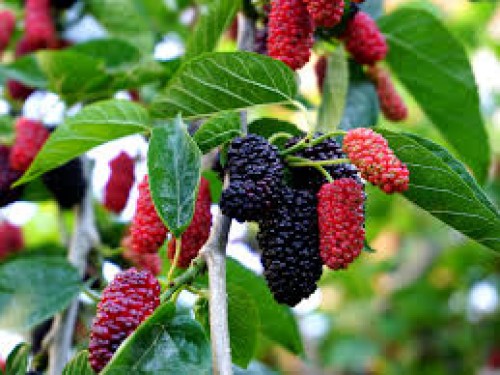off
-
Sold
-

out
Mulberry Plant: Care, Advantages & Nature
The Mulberry Plant (genus Morus) is a deciduous tree or shrub known for its sweet, flavorful berries. Native to Asia, Europe, and North America, the mulberry tree is widely appreciated for its fast growth, ease of care, and the tasty, nutritious fruit it produces. Mulberries are not only delicious but also have a variety of uses and health benefits. The plant is known for its versatility and is often found in home gardens and orchards.
Care of the Mulberry Plant
The Mulberry plant is relatively easy to grow and care for, as it is hardy and adaptable to various growing conditions. Here are key tips for maintaining a healthy mulberry plant:
- Climate: Mulberry trees thrive in temperate and subtropical climates. They require full sunlight to grow well and prefer moderate temperatures (15°C to 30°C or 59°F to 86°F).
- Soil: The plant prefers well-drained, loamy soil with a pH range of 6.0 to 7.5. While it can tolerate a variety of soils, it flourishes in rich, moist soil.
- Watering: Regular watering is essential, especially during dry periods. However, the tree should not be waterlogged, as it prefers well-drained soil. Deep watering is recommended to encourage strong root development.
- Fertilization: Mulberry plants benefit from a balanced fertilizer or organic compost applied during the growing season to support healthy growth and fruiting.
- Pruning: Prune the tree annually to remove dead or diseased branches and to encourage better airflow. This also helps maintain the tree's shape and encourages more fruit production.
- Pest & Disease Control: Mulberry trees are generally resistant to pests and diseases, but they may sometimes face issues with aphids, spider mites, or fungal diseases. Regular inspection and the use of organic pesticides like neem oil can help prevent infestations.
Advantages of the Mulberry Plant
- High Nutritional Value: Mulberries are rich in vitamin C, iron, potassium, and fiber. They are also a good source of antioxidants, which help fight free radicals in the body.
- Health Benefits: The fruits of the mulberry plant are known for their health benefits, including improving digestion, boosting the immune system, supporting heart health, and even regulating blood sugar levels.
- Versatility: Mulberry trees are versatile in their use. The fruits are eaten fresh, dried, or used in jams, jellies, and juices. The leaves of some varieties are also used as feed for silkworms.
- Fast Growth: Mulberry trees are fast-growing, with many varieties reaching maturity and fruit-bearing age in just 2–3 years. This makes them a great option for quick yields.
- Low Maintenance: Once established, mulberry trees are relatively low-maintenance. They are drought-tolerant and require little attention compared to other fruit trees.
- Ornamental Value: Mulberry trees can serve as attractive additions to gardens and landscapes due to their lush foliage and beautiful berries. They can also provide shade and privacy if planted strategically.
Nature of the Mulberry Plant
The mulberry tree is known for its hardy nature and adaptability to various environmental conditions. It typically grows into a small to medium-sized tree or shrub, with a broad, spreading canopy. Some varieties of mulberry are shrubs, while others can grow into large trees. The plant has heart-shaped leaves that provide dense shade, and its branches are often flexible and strong, making it suitable for a variety of growing conditions.
The mulberry tree also has a unique relationship with silkworms, as the leaves of the tree are the primary food source for these insects. This has made mulberry trees an important part of the silk industry in many countries, particularly in Asia.
Mulberry trees produce small, drooping clusters of berries that ripen in late spring or early summer. These berries can be red, white, or black depending on the variety, and they attract a variety of wildlife, including birds. The fruit is sweet and flavorful, with a slight tartness, and is enjoyed fresh or in a variety of recipes.
Conclusion
The Mulberry plant is a fantastic addition to any garden or orchard. It offers numerous benefits, from its fast growth and delicious fruit to its versatility and ease of care. Whether you are growing it for its nutritional value, ornamental appeal, or silkworm production, the mulberry tree is a valuable and rewarding plant. With proper care, a mulberry tree can provide years of enjoyment and health benefits for you and your family.

